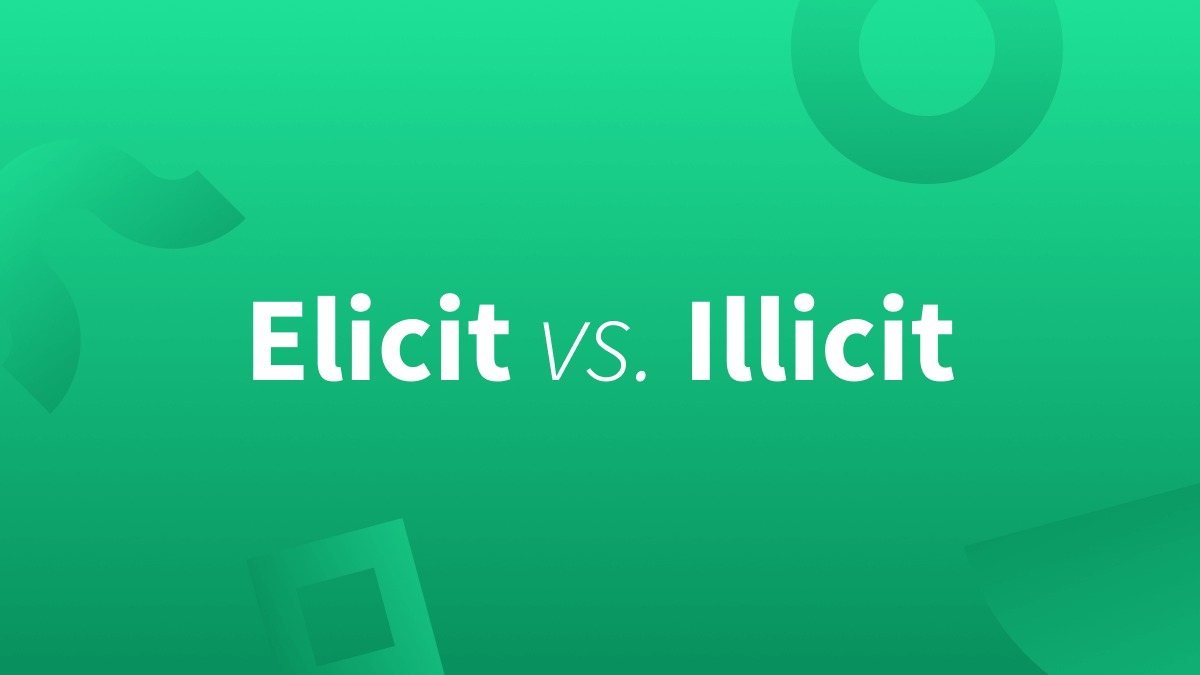Quick Summary on Using Elicit or Illicit
- The main difference between elicit and illicit is that elicit is a verb that means “evoke or draw out a response, answer, or fact from someone,” while illicit is an adjective that means “not permitted by laws, rules, or customs.”
- ○ She was trying to elicit a confession from me.
- ○ They were involved in illicit activities and therefore banned.
Is It “Elicit” or “Illicit”?
Elicit and illicit are homophones, which is why many people get these two words confused. They have the same pronunciation/ɪˈlɪsɪt/, but different definitions.
Elicit | Illicit
Elicit means “to call forth or draw out (something, such as information or response).” Illicit means “not permitted.” Below, we’ll elaborate on the definitions, provide example sentences, and synonyms.
What Does “Elicit” Mean?
Elicit is a verb—a word that conveys an action, condition, or experience. It means “to evoke, draw out, or bring light to.”
The lawyer was trying to elicit a response from her.
In the example sentence above, the lawyer is trying to bring forth a response from someone.
Here are a few more elicit example sentences:
The clowns at the birthday party elicited laughter from all the kids.
My wife was trying to elicit a confession from our daughters because she wanted to know who it was that broke the vase.
All the flashing lights and loud music elicited a pain on the right side of my head.
Synonyms (alternative words) of elicit are:
- Induce
- Trigger
- Extract
- Prompt
- Evoke
What Does “Illicit” Mean?
Illicit is an adjective—a word that describes or modifies a noun (a person, place, thing, or idea).
When something is illicit, it means that it is “illegal, improper, or not permitted by laws, morals, or customs.”
The police officers found illicit drugs in the van.
In the sentence above, the drugs are considered illicit because they are illegal by law.
Here are a few more illicit example sentences:
Their illicit behavior got the students kicked out of school.
The illicit trading of arms is what Sergeant Johanson most wanted to help bring to an end.
Although the practice was considered illicit, many people hoped that it would be legalized in the near future.
Synonyms (alternatives) of illicit are:
- Illegal
- Unlawful
- Criminal
- Prohibited
- Wrongful
Here’s How To Remember The Difference Between “Elicit” and “Illicit”
Here’s a quick tip to help you remember when to use elicit and illicit:
Elicit is a verb.
Illicit commonly means illegal, and they both start with “ill.”
Another foolproof way of never getting these two words mixed up again is by using LanguageTool as your writing assistant. Not only will this multilingual text editor correct spelling and grammar mistakes, but it’ll also provide synonyms and offer formatting suggestions to help enhance your writing.

